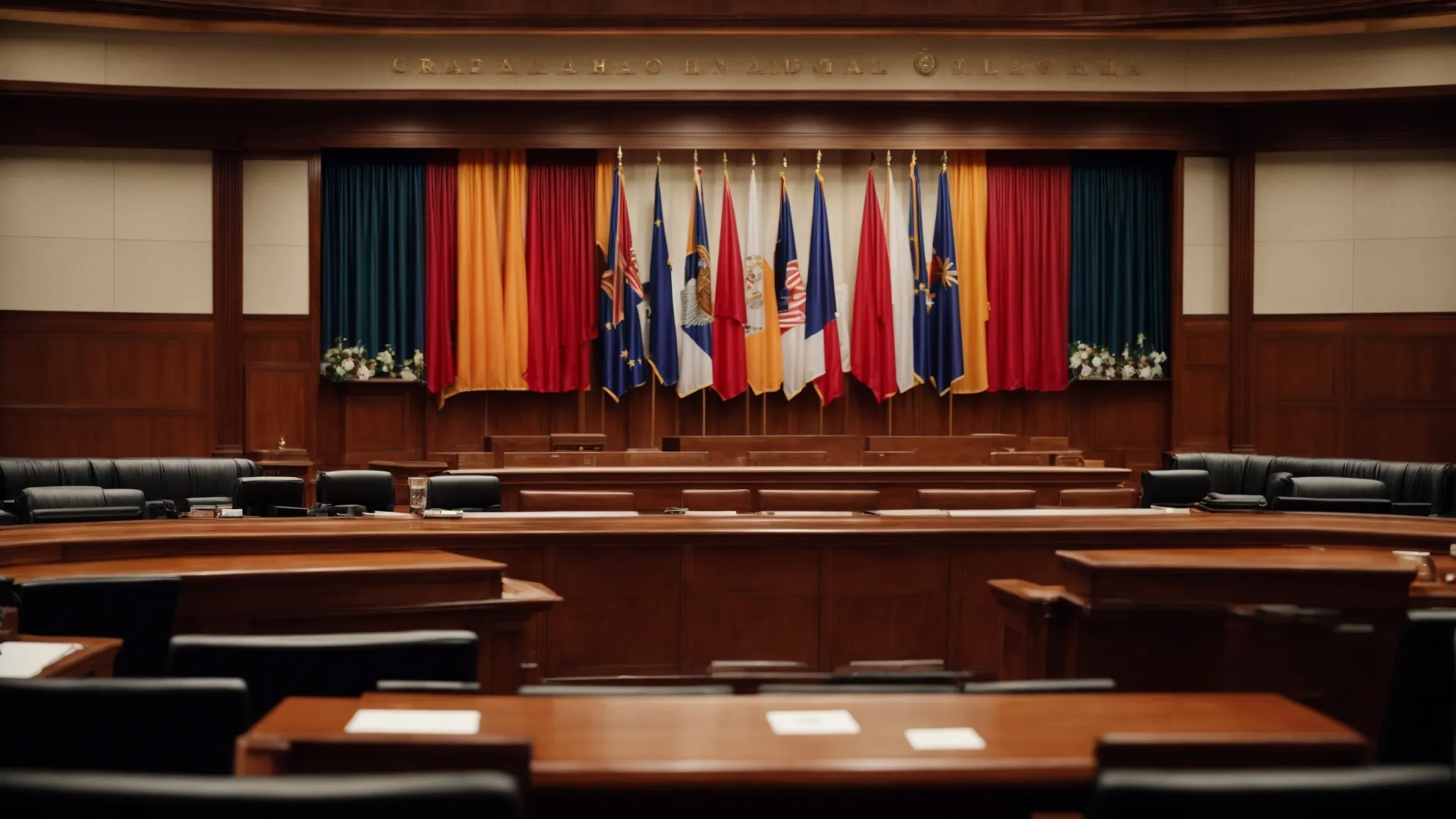Challenges and Criticisms of Investor State Dispute Mechanisms
The realm of international investment is fraught with complexity, especially where it intersects with government trade policy. At the heart of this intersection lies the controversial mechanism of Investor-State Dispute Settlement (ISDS), a process that allows corporations to initiate proceedings against countries for policies that allegedly harm their investments. The ISDS investment state dispute settlement system enables parties, such as lawyers and companies, to navigate international investment dispute settlement in accordance with the rule of law. Critics of ISDS argue that the process lacks transparency, is too costly, and undermines a state’s right to self-governance by allowing private arbitrators to make binding decisions. Yet, supporters contend that ISDS provisions are crucial for protecting international investment flows and offer a neutral forum for resolving disputes. Thus, it is crucial in Understanding Problems with Investor State Dispute Mechanisms. Keep reading to uncover the multifaceted challenges and the pointed critiques that shape the ongoing debate over these influential mechanisms.
Lack of Transparency in ISDS Mechanisms
- ISDS Mechanisms Face Criticism for Lack of Transparency and Its Impact on Public Interest and Government Accountability
- Concerns Arise Over Whether the Financial Burdens of ISDS Arbitrations Create an Uneven Playing Field Favoring Wealthier Entities
- The Impartiality of Arbitrators in Investment Disputes Is Questioned, Highlighting the Need for a Transparent Selection Process
- Inconsistent Arbitral Decisions Challenge the Trust and Predictability in International Investment Law
- Reformists Advocate for Standardized Decision-Making Protocols to Enhance Consistency in Investment Arbitration
The Inherent Lack of Transparency in ISDMs (“Understanding Problems With Investor-State Dispute Mechanisms”)

In the realm of International Investment Law, the opacity enveloping Investor-State Dispute Settlement (ISDS) mechanisms often garners intense scrutiny.
As these proceedings unfold, typically beyond the public gaze, firm criticisms emerge concerning the resulting lack of transparency.
The clandestine nature of these investment treaty arbitrations pits the confidentiality priorities of private investment interests against the broader mandates for government accountability and societal welfare.
Shrouded in confidentiality, these tribunal deliberations provoke questions regarding the eclipsing of public interests by anonymous resolutions.
The debate stretches further, calling for reform that could engender more transparent and accessible investment arbitration processes.
In dissecting these themes, the intricate balance between protecting sensitive corporate information and serving the public good becomes a pivot around which the discourse of transparency within ISDS mechanisms revolves.
Examining Confidential Proceedings in Investor-State Cases
Amidst the global landscape of trade and investment, confidential proceedings in investor-state cases continue to stir controversy. Stakeholders including corporations, host states, and civil society organizations, express concern over the opaqueness that lingers around the adjudication of disputes in private forums, often away from the scrutiny of interested and affected third parties.
The alarm sounds as proceedings, veiled behind closed doors, could potentially ensconce significant judicial decisions affecting public policy and national sovereignty. As arbitrators deliberate over the complex interplay of trade agreements, investment protections, and government regulations, the imperative for a more discernible dispute resolution environment resonates across jurisdictions.
Understanding the Impact of Non-Disclosure on Public Interests
Non-disclosure in the context of Investor State Dispute Settlement mechanisms significantly impacts the public by obscuring the rationale behind decisions that may alter national legal frameworks and affect citizens’ lives. Such obscurity can undermine trust in the equitable enforcement of laws and the democratic process itself, particularly when the outcomes have far-reaching implications on environmental regulations, public health, or social policies.
The veil of secrecy raises considerable concerns about the interplay between private interest and public welfare, with the potential for ISDS outcomes to exert pressure on lawmakers to tailor regulations in favor of foreign investors, thus constraining domestic policy space. This dynamic can lead to a chilling effect on the government’s ability to legislate for public benefit due to fears of litigation, impacting how societies manage their resources and protect the public interest.
Debating the Need for More Transparent Arbitration Processes
The call for greater transparency in investment treaty arbitration proceedings resonates throughout the sphere of international investment law, igniting a fervent dialogue among practitioners, academics, and policy-makers. It is posited that increased openness would not only fortify the legitimacy of investment state dispute settlement (ISDS) but also allay public apprehension about the fairness of dispute resolution.
This transition to transparency necessitates a structured approach that is sensitive to the diverse concerns of stakeholders: the government trade policy literature; the nuances between expropriation and fair compensation; and even the intricate aspects of investment treaty: power plant investments:
- Analyze the role of confidentiality and the interests it serves within investment arbitration.
- Articulate the potential benefits of transparent arbitration for government policy-making and civil society trust.
- Assess the impact of increased transparency on protecting the proprietary interests of firms and organizations.
The proposal for transparent dispute settlement mechanisms gains impetus from the assertion that justice should not only be delivered but should also appear to be delivered. Advocates contend that improved transparency could discourage the initiation of frivolous claims and reinforce the integrity of the adjudicative process itself.
Allegations of Bias and Conflict of Interest

In the intricate dance of global investment arbitration, where the integrity of judicial systems and adherence to fair trade practices are paramount, allegations of bias and conflict of interest strike at the very foundation of trust in Investor State Dispute Mechanisms (ISDMs).
The impartiality of arbitrators, a critical underpinning of legitimate dispute resolution, is frequently brought into question, prompting rigorous scrutiny of the entanglements that may influence decision-making.
The phenomenon known as the ‘revolving door,’ referring to the fluid movement between roles as judges and advocates, further fuels skepticism towards the adjudication process, placing the procedures for arbitrator appointments under a microscope.
These entwined factors catalyze spirited debate and invite a thorough evaluation of how impartiality, or the lack thereof, could shape the outcomes of investment disputes and ultimately the landscape of international investment itself.
Challenging the Impartiality of Arbitrators
Impartiality serves as the cornerstone of arbitration, yet the objectivity of arbitrators in investment disputes comes under intense fire. Appointed officials face heightened scrutiny when alleged conflicts of interest or preconceived biases may slant the scales of justice, compromising the very sanctity of fair and unbiased judgment.
Observers scrutinize not just the verdicts but also the composition of the tribunal itself: Does the arbitrator have a history with the disputing entity? Is there a record of recurrent appointments by a certain firm or government? These inquiries pierce the surface, revealing potential undercurrents of predisposition that could taint the arbitration outcomes:
| Concern | Implication |
|---|---|
| Arbitrator’s Past Engagements | Questions regarding the impartiality and independence of the decision-makers |
| Frequency of Appointments | Potential for perceived favoritism in the arbitration process |
| Arbitrator-Firm Relationships | Risks to the integrity of the tribunal and trust in the wider investment arbitration system |
Scrutinizing the Revolving Door Between Judges and Advocates
The practice where legal professionals oscillate between the roles of judges and advocates in the arbitration arena faces critical examination. This revolving door phenomenon is feared to imbue legal practitioners with an undue advantage, leveraging their dual experiences in a manner that could unfairly influence case outcomes or lead to potential biases in investment dispute resolution.
Detractors argue that such transitions between judicial and advocacy roles may erode the perceived impartiality essential to the integrity of dispute settlements. They urge for mechanisms that can monitor and mitigate any potential conflicts arising from these role reversals, ensuring that equity and fairness remain at the forefront of investment arbitration proceedings.
Evaluating the Role of Arbitrator Appointments in Perceived Bias
The selection process for arbitrators remains a fulcrum of contention, where the opaque nature of appointments frequently gives rise to suspicions of partiality. Transparency in the selection process is advocated by many as a remedy to preempt allegations of bias that may compromise the adjudication’s legitimacy.
Perceptions of bias are particularly poignant in cases where arbitrators are recurrently selected by the same parties, signaling the possibility of undue influence or preferential treatment. The integrity of investor state dispute mechanisms hinges on adopting appointment procedures that prioritize diverse representation and impartial expertise.
Sovereignty Concerns in Investor-State Dispute Settlement

In the intricate drama of international investment, the sovereignty of nations often stands at the precipice of complex legal debates, brought to the fore by the surge in Investor-State Dispute Settlement (ISDS) cases.
Within this arena, pivotal moments arise when host state policy initiatives collide with the vested rights of foreign investors, challenging the fundamental ethos that underpins a nation’s right to self-determine its regulatory trajectory.
These junctures raise fundamental questions about the delicate equilibrium sought between safeguarding foreign investments and maintaining sovereign authority, all while examining the nuanced pressure ISDS mechanisms exert on the domestic legal frameworks that buttress government sovereignty and public interest.
Analyzing Cases Where Government Policy Clashed With Investor Rights
Instances where nation-states enact policies that encroach upon the profits or operations of foreign investors often become flashpoints that test the limits of sovereign authority. Notable among these are cases where governments introduce environmental regulations that affect the viability of foreign-owned power plants, prompting investors to seek redress through ISDS, claiming expropriation or unfair treatment under international trade agreements and investment treaties.
The balance of power tilts precariously when trade agreements grant investors the right to initiate dispute settlement proceedings against a host state. A pertinent example is the clash between tobacco control legislation and the interests of tobacco companies, leading to contentious legal challenges that invoke the provisions of investment agreements and elevate the tension between public health objectives and investors’ rights.
The Balance Between Protecting Investments and Upholding National Interests
The investment landscape teeters on a precarious fulcrum when member states must navigate the dual imperatives of protecting foreign direct investment (FDI) flows while implementing sovereign policies that reflect national priorities. Situations arise wherein the enforced government trade policy, albeit aimed at fostering long-term economic development or protecting public health, may inadvertently cause disruption to international investment agreements, triggering investment disputes.
The ensuing tension between maintaining investment appeal and exercising legislative sovereignty shapes an intricate narrative in investment law:
- Host states must carefully draft and implement policies, considering potential repercussions under various trade and investment pacts.
- Foreign investors strive to operate within these legal frameworks, all the while safeguarding their ventures against abrupt policy shifts or acts of expropriation.
- The role of the European Union, World Trade Organization, and other bodies in harmonizing the objectives of investment protection and government autonomy comes into sharp focus.
As parties to investment treaties, both states and corporate entities grapple with an environment fraught with complexities, seeking equilibrium where legal protections for investors do not overreach into constraining legitimate regulatory actions of the host state.
Assessing the Pressure of ISDS on Domestic Legal Systems
The permeation of ISDS provisions into domestic legal systems stirs profound discomfort among some sectors of society, challenging the authority of national courts and the legislative process. Allegations contend that the very architecture of ISDS, wherein decisions are made by panels of arbitrators rather than judges within the host state’s judicial framework, can exert undue pressure on a country’s ability to self-govern, potentially subjugating national laws to international arbitral rulings.
Legislative decisions, once autonomous, now face the prospect of international oversight, as foreign investors can invoke ISDS clauses within investment treaties, questioning the propriety of government actions. This dynamic not only challenges the host state’s legal policies but also incites a reevaluation of national strategies toward investment agreements, compelling states to ponder the balance between attracting FDI and preserving the sanctity of their own legal institutions.
The Limited Scope for Appealing ISDS Decisions

The arena of Investor State Dispute Settlement (ISDS) is fraught with complexities, not least of which is the limited scope afforded for challenging arbitration decisions.
Once an award is rendered, the avenues for recourse are often narrow, tightly circumscribed by the rules governing international arbitration.
The inflexibility in reviewing or overturning these decisions raises formidable concerns among member states, investors, and legal practitioners.
This reality ignites a burgeoning discourse on the finality of arbitration awards, the need for possible mechanisms of annulment or review, and the burgeoning discussions about instituting an appellate body to provide an additional layer of scrutiny to these often consequential determinations.
Investigating the Finality of Arbitration Awards
The definitive nature of arbitration awards in the context of ISDS raises the stakes substantially for the disputing parties. Actors within these mechanisms often find themselves bound by the arbitrators’ verdicts, with sparse opportunity for reconsideration or reversal, highlighting the pressing need to consider avenues for appeal that ensure equitable justice.
Societal concern and legal critique underscore the rigidity of the current system where arbitration awards, once issued, become largely unassailable. This lack of appellate review raises fundamental questions about the infallibility of initial decisions and propels the ongoing discourse on the necessity for mechanisms that allow a second look at these binding judgments.
Understand the Options for Review or Annulment
The mechanisms available for the review or annulment of Investor State Dispute Settlement decisions are limited, primarily to the grounds stipulated by the underlying arbitration rules or the treaty provisions in force. These options, constrained as they are, can include assertions of a tribunal exceeding its authority, failing to apply the proper law, or manifest errors in the application of the law.
Uncoverings of procedural irregularities or evidence of arbitrator bias represent some of the few bases that can trigger an annulment process, yet even when these criteria are met, the journey to successfully overturning an ISDS decision remains a formidable challenge that hinges on the narrow straits defined by the intricacies of international investment law.
Discussing the Call for an Appellate Mechanism
The discourse on refining Investor State Dispute Settlement mechanisms encompasses a significant demand for an appellate layer to rectify potential errors within initial verdicts. Advocates for such a revision suggest that an appellate body could serve as a safeguard against judicial missteps, strengthening the credibility and reliability of the entire ISDS system.
On the international stage, stakeholders from various sectors endorse the concept of a structured review process, akin to domestic legal systems where higher courts scrutinize lower court verdicts. This step, they argue, would not only enhance procedural fairness but also harmonize legal interpretations across different tribunals, thereby contributing to more consistent and predictable outcomes in international investment litigation.
The Rising Costs of Investor-State Arbitrations

The debate surrounding Investor State Dispute Settlement (ISDS) systems often fixates on their inherent opacity, yet an equally contentious aspect is the mounting financial burden these mechanisms impose on nations and investors alike.
The increasingly exorbitant costs associated with ISDS arbitrations loom large, impacting both the proceedings and the participants, and raising serious questions about the sustainability and fairness of the ISDS investment process.
As states and smaller investors grapple with the escalating legal fees and associated expenditures, the concern intensifies over the formidable barriers to entry this creates in the domain of international investment arbitration.
This financial obstacle course stands as a critical aspect of the broader conversation about the efficacy and equitability of ISDS mechanisms.
Examining the Financial Burden of ISDS on Nations
The palpable financial strain of participating in Investor State Dispute Settlement (ISDS) arbitrations is felt most acutely by nations, particularly when they serve as the defendant. The specter of exorbitant legal fees, coupled with hefty compensation payouts, risks depleting national coffers, an outcome that can have dire repercussions on a country’s economic stability and resource allocation for critical public services.
Even as nations endeavor to navigate the tumultuous waters of international investment, they confront the daunting prospect of ISDS proceedings that can extend for years, further compounding the monetary implications. This protracted engagement demands not only substantial financial resources but also the sustained attention of government personnel, diverting precious attention away from domestic governance priorities and into the costly arbitration labyrinth. ISDS investment is a complex system that requires the expertise of lawyers and the involvement of parties. See Law Firms, Arbitrators & Arbitration Centers – ISDS (georgetown.edu)
Analyzing the Impact of Legal Costs on Case Outcomes
The impact of towering legal costs on the outcomes of Investor-State Dispute Settlement disputes cannot be overstated. Companies and governments alike face a daunting reality where financial prowess may implicitly tip the scales, potentially favoring entities with deeper pockets that can sustain prolonged legal battles and afford top-tier legal representation.
Observers note that such economic dynamics could inadvertently skew the dispute resolution process, creating an uneven playing field where the merits of a case are at risk of being overshadowed by the financial capacity of the parties involved. This introduces a critical examination of whether justice in investment arbitration is accessible to all or is becoming the domain of the financially robust.
Questioning the Accessibility of ISDS for Smaller Investors and States
The gauntlet of Investor State Dispute Settlement (ISDS) proceedings presents daunting financial and procedural obstacles for smaller investors and less economically robust states. This unequal playing field often dissuades such actors from pursuing legitimate claims, potentially compromising their ability to safeguard investments against unjust treatment or policy shifts.
As the costs of engaging in ISDS rise, concerns intensify about the equitable nature of the system and whether it disproportionately favours large corporations or wealthier nations, thereby undermining the principle of justice being blind to the might of one’s economic clout.
Inconsistencies and Unpredictability in Arbitration Outcomes

The arbitration landscape in Investor State Dispute Settlement (ISDS) is rife with a unique set of complications, as stakeholders are faced with the challenge of navigating through decisions that are often inconsistent and unpredictable.
The unpredictable nature of these outcomes heralds a significant coherence issue within the sphere of international investment law, complicating the environment for cross-border investors and sovereign states alike.
With eyes fixed on cases that present divergent interpretations on similar issues, the sector grapples with the impacts of these discrepancies.
It amplifies the call for a more standardized approach to arbitral decision-making to bolster the reliability and predictability of awards—cornerstones of an effective and equitable ISDS framework.
Reviewing Cases With Divergent Interpretations of Similar Issues
The adjudication of investor-state disputes sometimes yields divergent interpretations of issues that bear striking similarities, casting a shadow on the predictability that parties expect from the arbitration process. Disparate rulings on comparable legal questions introduce uncertainty into the investment climate, potentially deterring parties from engaging with the system out of fear of arbitrary outcomes.
As practitioners and academics dissect these varying decisions, the drive for a harmonized interpretative approach intensifies, underscoring the imperative for enhanced consistency in legal reasoning. This would ensure that the principles of investment law are applied uniformly, paving the way for more foreseeable and equitable resolutions in future disputes.
The Impact of Inconsistent Rulings on International Investment Law
The trustworthiness of the international investment law framework relies heavily on the coherence of arbitral rulings. When arbitrators deliver inconsistent decisions on similar or identical matters, this perceived unpredictability casts doubt on the rules and norms of international investment law, complicating the risk assessment for both investors and states.
Inconsistency can erode the authority and credibility of investor-state dispute settlement mechanisms. This, in turn, pressures member states, corporations, and the commission responsible for negotiations to analyze and perhaps redefine the tenets that govern investment disputes and the enforcement of rulings.
| Issue | Inconsistency | Impact on International Investment Law |
|---|---|---|
| Arbitration Clarity | Varying Interpretations | Decreased Predictability for Risk Assessment |
| Authority of ISDS | Perceived Arbitrariness | Erosion of Dispute Mechanism’s Credibility |
| Enforcement of Rulings | Divergent Outcomes | Pressure on States and Corporations to Rethink Legal Frameworks |
Advocating for Standardization in Arbitral Decision-Making
The pursuit of a standardization framework in arbitral decision-making garners considerable endorsement as a strategy to mitigate the erratic nature of ISDS outcomes. Proponents believe that a more uniform approach would elevate the predictability vital for both member state and investor confidence, fostering a stable environment conducive to international investment.
Reformists articulate the necessity for standardized protocols or guidelines that could guide arbitrators in rendering decisions, thus narrowing the scope for discrepant interpretations and enhancing the overarching consistency of investment law:
| Element | Standardization Goal | Expected Outcome |
|---|---|---|
| Protocol | Guide Arbitrator Decision-Making | Minimize Discrepant Interpretations |
| Guidelines | Uniform Application of Investment Law | Strengthened Consistency and Predictability |
By aligning arbitral decisions with a coherent set of standards, the international investment community advocates for a systemic change that promises a more navigable and reliable dispute resolution terrain. This transformation could significantly influence the efficacy of ISDS, assuring all parties that the rules of engagement in investment arbitration are not only clearly defined but equitably applied.
Conclusion
The numerous challenges and criticisms of Investor-State Dispute Mechanisms (ISDMs) highlight the urgency for reform in international investment arbitration.
The procedural opacity surrounding these systems triggers grave concerns about transparency, particularly in matters where public policy and private interests intersect.
Moreover, allegations of arbitrator bias and conflict of interest threaten the integrity and impartiality of the dispute settlement process.
Questions also arise about the erosion of state sovereignty as nations struggle to balance policy autonomy with investor protections under the pressure of ISDS outcomes.
Compounding these issues is the limited opportunity for appealing ISDS decisions, which casts doubts on the finality and correctness of arbitration awards.
Financially, the high costs of proceedings place an undue burden on states and are prohibitive for smaller investors, creating a barrier to access and potentially undermining the fairness of the system.
Furthermore, the inconsistencies and unpredictability of rulings exacerbate the investment risks, calling for a push toward standardized decision-making to ensure predictability and credibility within the framework. In sum, the complex and multifaceted challenges faced by ISDMs underline the critical need for a comprehensively reformed dispute resolution mechanism. Such reform would aim to balance the protection of investments with fair, transparent, and equitable consideration of public and state interests while also ensuring the system’s accessibility and consistency. If you would like to have more resources about ISDS, please visit our legal articles on Investor Disputes. Our law firm frequently publishes articles within the realms of international arbitration.


